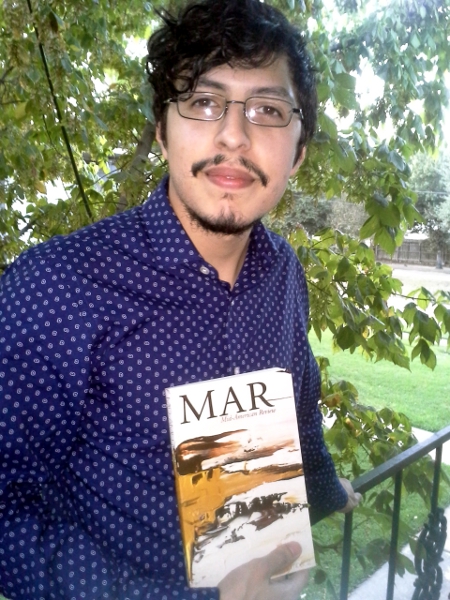
Our first contributor interview for 2015 will also be our penultimate contributor interview from Vol. XXXIV, Number 2. Turn to page 150 of that issue, and you’ll find Estanislao Lopez’s haunting poem, “The Politics of Rivers.” From the opening lines (“Behind brown sheets of dust, my grandfather’s voice / ripened with stories he thought forgotten”) to the stunning conclusion, this poem is about memory, cultural identity, homesickness, time, and so much more.
Estanislao Lopez studied philosophy and creative writing at the University of Houston. After graduating, he began teaching literature and creative writing at the secondary level. His work has appeared or is forthcoming in Ninth Letter, Meridian, New Ohio Review, and elsewhere. He currently lives, works, and flounders in Houston.
Quick! Summarize your poem in 10 words or fewer.
Water (fluid) demarcates cultural identity (static?)—turmoil ensues.
What can you share about this piece prior to its MAR publication?
This is my first relatively successful poem to tackle ethno-cultural themes. Most attempts previous to this poem (and following) fail to achieve the kind of nuance I think the issue deserves. As a second-gen Latino writer on the assimilated side of the spectrum, I find it difficult to pin the speaker right between those two worlds, struggling with a sense of alienation from both.
What was your reaction upon receiving your MAR acceptance?
I took back what I said about never getting published again.
What do you consider your biggest writing-related success?
My first publication appeared in an issue with two wonderful mentors of mine, Tony Hoagland and Ange Mlinko, both of whom (along with my primary advisor, Kevin Prufer) guided me in my undergraduate senior thesis. Seeing their names beside mine is still kind of surreal. Definitely a high point.
You’re at a family reunion and some long-lost relative asks about your writing. What do you say?
I pretend I primarily write fiction.
Your biggest writing-related regret?
The same as every writer I’ve ever talked with: not writing more. I have very poor executive function, so this might be a bigger problem for me than most. Once I start writing, the world hushes, but getting to that start point requires a Herculean effort. I had a regular schedule going at one point about a year ago, but eventually I started to rebuke my own authority. Hopefully, I can bring sexy discipline back.
Tell us one strange thing about yourself that does not involve writing.
I often meander from room to room, forgetting any initial motive for walking in there (related to the poor executive function).
Tell us one strange thing about yourself that does involve writing.
I am an obsessive revisionist. At one point, I believe I was revising a single poem at least nine times a day for a month. I definitely can find myself over-editing a poem—chiseling out its soul. Luckily, I can spot this error after creating some distance for a while and then checking back—or when someone else clues me in on the fact.
Do you have another favorite piece of writing in this MAR issue? If so, name it and tell us why.
My favorite piece in this issue would have to be “Panacea” by Philip Jason. This short story rivets us with its authoritative imagination. The unsettling humor provides just enough buoyancy to counterbalance those heavier, epiphanic moments. I find this story is one of those sparkling few pieces of writing that harnesses the true power of surrealist/absurdist stylization, which is to reach sincerity through them. The sincerity juxtaposed against the playfulness of style makes for one hell of a moving piece of literature.
Can you show us a photo of you holding your MAR contributor’s copy?
Thanks for the interview, Estanislao!
Laura Maylene Walter, Fiction Editor

